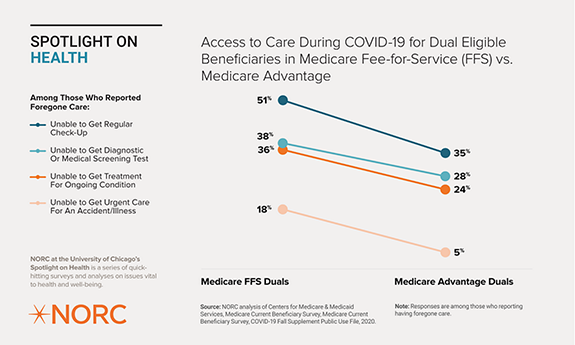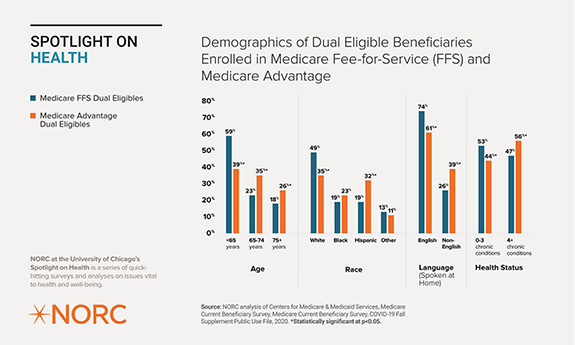Dual Eligibles in Medicare Advantage Faced Fewer COVID-Related Disruptions in Care than Those in Traditional Medicare
CHICAGO, May 18, 2021 — Dual eligible beneficiaries (dual eligibles) enrolled in Medicare Advantage (MA) were less likely to experience disruptions in their health care during the COVID-19 pandemic than dual eligibles enrolled in traditional fee-for-service (FFS) Medicare, according to new analysis from NORC at the University of Chicago.
Dual eligibles are low-income Medicare enrollees who receive additional financial help and benefits from the Medicaid program. According to experts at NORC at the University of Chicago, dual eligibles are some of the most complex and vulnerable seniors. Furthermore, dual eligibles who chose to enroll in MA tend to be older, sicker, and more racially and ethnically diverse than their dual eligible counterparts in the traditional FFS Medicare program.
Despite being older and sicker, dual eligibles in MA were less likely to report difficulty accessing care during the COVID-19 pandemic. Among beneficiaries reporting foregone care in 2020, only 35 percent of dual eligibles in MA said they were unable to get a regular check-up during the pandemic, compared to 51 percent in FFS. Similarly, dual eligibles in MA were less likely to report that they were unable to get diagnostic or medical screening tests, treatment for ongoing conditions, and urgent care for accidents or illnesses during the pandemic.


Spotlight on Health:
Access to Care During COVID-19 for Dual Eligible
“Medicare Advantage dual eligibles experienced fewer disruptions in care during the pandemic, which may be the result of added care coordination and outreach from their health plans,” said Caroline Pearson, senior vice president at NORC at the University of Chicago. “Older adults often select Medicare Advantage plans due to expanded benefits and lower out-of-pocket costs. But especially during a pandemic, navigation and care coordination services are critical to help close gaps in care.”
Twenty six percent of dual eligibles who chose MA are age 75 or older, compared to 18 percent of dual eligibles enrolled in FFS. Dual eligibles in MA were more likely to be Black and/or Hispanic, and more likely to speak a language other than English at home. Further, 56 percent of dual eligibles who chose MA have four or more chronic conditions, compared to only 47 percent of those in FFS.


Spotlight on Health:
Demographics of Dual Eligible Beneficiaries
“In recent years, Medicare Advantage plans have increasingly enrolled more complex and medically frail members,” said Mairin Mancino, senior director of Health Care Strategy at NORC at the University of Chicago. “Older adults with higher medical needs can benefit greatly from improved care management and coordination of services that Medicare Advantage plans provide.”
Funding for this analysis was provided by America’s Health Insurance Plans (AHIP). NORC retained full control over the data, methods, and content of the analysis.
Methodology
NORC produced a comparative analysis of COVID-19 experience for Medicare beneficiaries enrolled in Medicare Advantage plans compared to those in FFS. This Spotlight on Health analyzed demographics and COVID-19 impacts on full-benefit dual eligibles, individuals with Medicare coverage who qualify for all services covered by their state Medicaid programs in addition to financial assistance with Medicare cost-sharing.
This analysis used the Medicare Current Beneficiary Survey (MCBS) COVID-19 Fall 2020 Supplement Public Use File (PUF) to analyze the differential impacts of COVID-19 on Medicare beneficiaries in FFS and Medicare Advantage beneficiaries. The specification of Medicare beneficiaries enrolled in FFS or Medicare Advantage, as well as dual eligible status was added to the files from administrative data from Centers for Medicare & Medicaid Services (CMS). The MCBS is a continuous, multi-purpose longitudinal survey representing the population of Medicare beneficiaries living in the United States. The MCBS COVID-19 Rapid Response Supplement is a nationally representative, cross-sectional telephone survey of 9,686 Medicare beneficiaries administered from October 2020 through November 2020.
About NORC at the University of Chicago
NORC at the University of Chicago conducts research and analysis that decision-makers trust. As a nonpartisan research organization and a pioneer in measuring and understanding the world, we have studied almost every aspect of the human experience and every major news event for more than eight decades. Today, we partner with government, corporate, and nonprofit clients around the world to provide the objectivity and expertise necessary to inform the critical decisions facing society.
Contact: For more information, please contact Anna-Leigh Ong at NORC at ong-anna-leigh@norc.org or (917) 242-2172 (cell).





